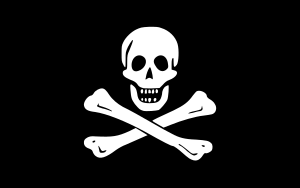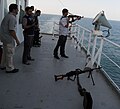Portal:Piracy
Introduction

Piracy is an act of robbery or criminal violence by ship or boat-borne attackers upon another ship or a coastal area, typically with the goal of stealing cargo and other valuable goods. Those who conduct acts of piracy are called pirates, and vessels used for piracy are called pirate ships. The earliest documented instances of piracy were in the 14th century BC, when the Sea Peoples, a group of ocean raiders, attacked the ships of the Aegean and Mediterranean civilisations. Narrow channels which funnel shipping into predictable routes have long created opportunities for piracy, as well as for privateering and commerce raiding.
Historic examples of such areas include the waters of Gibraltar, the Strait of Malacca, Madagascar, the Gulf of Aden, and the English Channel, whose geographic structures facilitated pirate attacks. The term piracy generally refers to maritime piracy, although the term has been generalized to refer to acts committed on land, in the air, on computer networks, and (in science fiction) outer space. Piracy usually excludes crimes committed by the perpetrator on their own vessel (e.g. theft), as well as privateering, which implies authorization by a state government.
Piracy or pirating is the name of a specific crime under customary international law and also the name of a number of crimes under the municipal law of a number of states. In the 21st century, seaborne piracy against transport vessels remains a significant issue, with estimated worldwide losses of US$25 billion in 2023, increased from US$16 billion in 2004. (Full article...)
Selected biography -
Woodes Rogers (c. 1679 – 15 July 1732) was an English sea captain, privateer and colonial administrator who served as the governor of the Bahamas from 1718 to 1721 and again from 1728 to 1732. He is remembered as the captain of the vessel that rescued marooned Scottish sailor Alexander Selkirk, whose plight is generally believed to have inspired Daniel Defoe's novel Robinson Crusoe. Rogers came from an experienced seafaring family, grew up in Poole and Bristol, and served a marine apprenticeship to a Bristol sea captain. His father held shares in many ships, but he died when Rogers was in his mid-twenties, leaving Rogers in control of the family shipping business.
In 1707, Rogers was approached by Captain William Dampier, who sought support for a privateering voyage against the Spanish, with whom the British were at war. Rogers led the expedition, which consisted of two well-armed ships, Duke and Duchess, and was the captain of Duke. In three years, Rogers and his men went around the world, capturing several ships in the Pacific Ocean. En route, the expedition rescued Selkirk, finding him on Juan Fernández Island on 1 February 1709. When the expedition returned to England in October 1711, Rogers had circumnavigated the globe, while retaining his original ships and most of his men, and the investors in the expedition doubled their money. (Full article...)Selected article -
As a practice of piracy, petro-piracy, also sometimes called oil piracy or petrol piracy, is defined as “illegal taking of oil after vessel hijacks, which are sometimes executed with the use of motorships” with huge potential financial rewards. Petro-piracy is mostly a practice that is connected to and originates from piracy in the Gulf of Guinea, but examples of petro-piracy outside of the Gulf of Guinea is not uncommon. At least since 2008, the Gulf of Guinea has been home to pirates practicing petro-piracy by targeting the region's extensive oil industry. Piracy in the Gulf of Guinea has risen in the last years to become the hot spot of piracy globally with 76 actual and attempted attacks, according to the International Maritime Bureau (IMB). Most of these attacks in the Gulf of Guinea take place in inland or territorial waters, but recently pirates have been proven to venture further out to sea, e.g. crew members were kidnapped from the tanker David B. 220 nautical miles outside of Benin. Pirates most often targets vessels carrying oil products and kidnappings of crew for ransom. IMB reports that countries in the Gulf of Guinea, Angola, Benin, Cameroon, Equatorial Guinea, Ghana, Guinea, Ivory Coast, Togo, Congo, and, especially, Nigeria, have experienced petro-piracy and kidnappings of crew as the most common trends of piracy attacks in the Gulf of Guinea.
The region of the Gulf of Guinea brings together a very large number of oil-rich, coastal states, forming a coastline of 6.000 kilometres from Senegal in West Africa to Angola in Southern Africa. Furthermore, the region supplies a very large amount of oil to European and American markets, as well as being an important transit route for international oil transportation. These two factors, oil production and international oil transportation, make the Gulf of Guinea a favourable area for petro-piracy. Off the coast of Nigeria and around the Niger Delta is “the epicentre for illicit energy-maritime criminal activities with petro-pirates…”. Especially, on the coastal waters in Nigeria, acts of depredation against ships and fixed oil installations have been taking place, consequently resulting in “far greater financial losses and a far wider economic impact than anything seen so far anywhere in the world.”. Generally, piracy in the Gulf of Guinea is to some extent a Nigerian problem – as it originates for insurgency and instability as well as corruption in Nigeria. (Full article...)Did you know?
- ... that Saudi Arabian broadcaster beoutQ pirated and resold beIN Sports programmes during the Qatar diplomatic crisis?
- ... that indigenous Australian artist Daniel Boyd has depicted colonial figures including Captain James Cook and Governor Arthur Phillip as pirates?
- ... that since 1904 the Gasparilla Pirate Festival in Tampa, Florida, has featured a pirate-themed parade?
- ... that the developers of Hotline Miami 2: Wrong Number suggested that Australian customers pirate their game?
- ... that HMS Redpole, one of the aptly-named coffin brigs, sank in an action with a pirate vessel in August 1828?
- ... that English pirate Henry Every, who was sometimes known as Long Ben, was one of the few major pirate captains to retire with his loot without being arrested or killed in battle?
- ... that, while it is unknown if pirates actually kept parrots as pets, it is thought that at least some captains kept cats aboard to keep populations of rats and other vermin down?
- ... that in 2011, pirates were reported as raiding along the Danube River in the center of Europe?
Selected quotations
| “ | Come, let us make a hell of our own, and try how long we can bear it. | ” |
| — Blackbeard | ||
General images
Selected Jolly Roger

Subcategories
Topics
WikiProjects
Related portals
Things you can do

Contribute
- Work on piracy and pirate articles and help improve them to featured articles.
Expand
Join
WikiProject Piracy Requests
- eliminate red links from List of pirates
- expand Timeline of piracy, specifically to fill in vast gap between the 1890s to 2000s
- revise Bartholomew Roberts
- help with Requested articles and Expand articles
- help with Portal:Piracy
- Create Modern Piracy
Associated Wikimedia
The following Wikimedia Foundation sister projects provide more on this subject:
-
Commons
Free media repository -
Wikibooks
Free textbooks and manuals -
Wikidata
Free knowledge base -
Wikinews
Free-content news -
Wikiquote
Collection of quotations -
Wikisource
Free-content library -
Wikiversity
Free learning tools -
Wiktionary
Dictionary and thesaurus










































































































